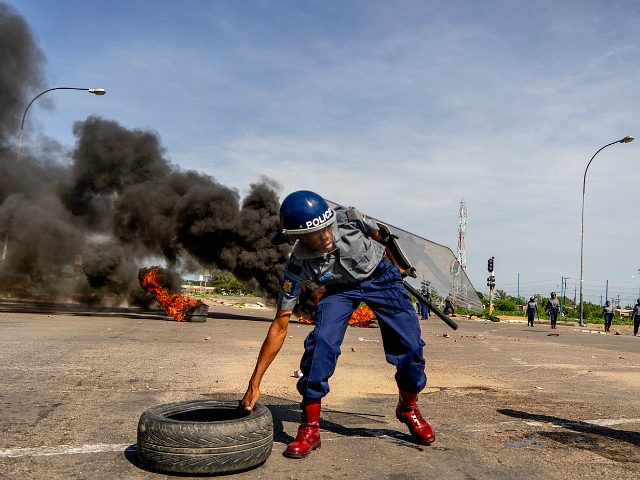Protests against the economic crisis in Zimbabwe, which erupted Monday after President Emmerson Mnangagwa more than doubled fuel prices, reportedly prompted the government to restrict the internet over the alleged use of the social media to incite the demonstrations and sparked rampant looting in the impoverished African nation.
New Zimbabwe reports:
The government was also accused of shutting down the internet with communication on the popular WhatsApp platform impossible from mid-morning and access to social media sites such as Twitter and Facebook restricted.
Mobile phone networks were also partially shut down, with one industry source saying the systems had been jammed and many users complaining of limited access. The opposition said the internet blockade was aimed at covering up a crackdown against civilians by the security services.
Owen Ncube, the minister of state for national security in Zimbabwe, accused the leading opposition party MDC Alliance of coordinating the protests and inciting people to come out for violent demonstrations via social media, an accusation rejected by the opposition, Al Jazeera notes.
The Mnangagwa administration restricted internet access following a government warning against using social media to plan demonstrations.
Moreover, the demonstrations have triggered food shortages and looting “as people, particularly young boys, break into supermarkets, bars, and hardware stores to grab food and other items” amid the chaos, Al Jazeera reveals.
President Mnangagwa traveled to Russia amid the unrest as part of a five-country tour of eastern Europe to expand Zimbabwe’s business links. The African leader has assured Zimbabweans his administration’s austerity measures will pay off.
“Bitter critic and exiled former cabinet minister Professor Jonathan Moyo scorned the Zimbabwean leader for hiring a luxury jet for the trip after stoking unrest back home,” New Zimbabwe notes.
The three-day national strike called by labor unions and anti-government activists entered its second day Tuesday after a violent start Monday.
Soldiers patrolled city streets in Zimbabwe on Tuesday, as clashes between protesters and security forces killed at least five people, including a police officer, and injured dozens of others, Al Jazeera reports, adding:
Authorities have called for order and issued a stern warning against attacks on police stations and civilian property. Overall, at least 200 people have been arrested in connection with the ongoing violence, which has seen shops destroyed and burned overnight. Army trucks and anti-riot vehicles continuously patrolled the low-income areas of Bulawayo, firing tear gas and warning shots in a bid to stop the protesters. Amid the chaos, looting has also erupted. Looters, who refused to go on record, told Al Jazeera they were taking the opportunity to stock up their homes with food and other necessities, rather than pay the exorbitant prices that had resulted from the fuel hikes.
According to MDC, “terrorists” from the ruling Zanu-PF party detonated a petrol bomb at the opposition party’s head office in Harare on Monday.
“The attack on Morgan Tsvangirai House came as human rights lawyers accused the security services of carrying out brutal reprisal attacks against protestors in night raids across high-density neighborhoods,” New Zimbabwe reveals.
The MDC took to Twitter to condemn the attack.
“We certainly have a terrorist organization in Zimbabwe, when they have a problem with managing the country, they burn HQs,” Nkululeko Sibanda, a spokesperson for MDC, reportedly wrote on Twitter. “They bombed the MDC HQ, hoping to destroy us, they bombed daily news, and now they just burned MRT House. Boko Haram is in Zimbabwe. Why would Zanu PF do this?”
The Zimbabwe Lawyers for Human Rights (ZLHR) accused the country’s security services of launching night reprisal raids against civilians in some of the capital’s high-density suburbs.
New Zimbabwe notes:
The demonstrations were sparked by growing public anger over Zimbabwe’s worsening economic crisis erupted. Government more than doubled petrol prices at the weekend after months of shortages when drivers have been forced to queue for hours to fill up, while essentials such as bread and medicines have also been scarce. … Zimbabwe’s economy has been in dire straits since hyperinflation wiped out savings between 2007 and 2009 when the Zimbabwean dollar was abandoned in favor [of] the US dollar.
Mnangagwa, who narrowly won a disputed election against MDC Alliance leader Nelson Chamisa, vowed to revive the economy but has failed.
Members of the ruling Zanu PF party blamed the opposition, the MDC Alliance, for the violence.

COMMENTS
Please let us know if you're having issues with commenting.